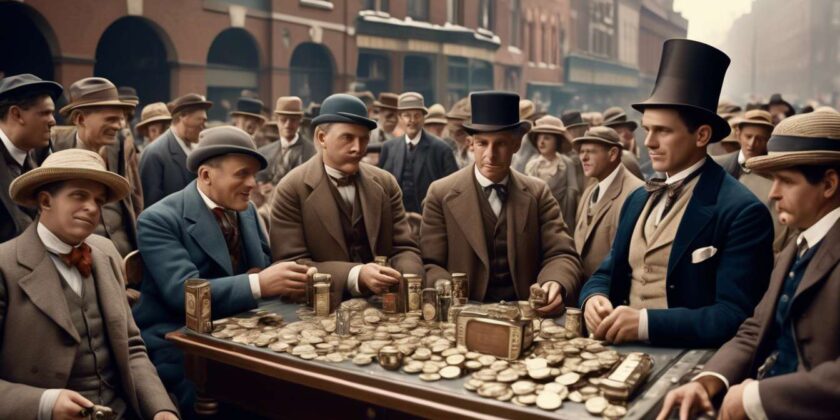The Journey of Sports Betting in the 1900s
As we embark on a journey through the history of sports betting in the 1900s, we are intrigued by the evolution of this popular pastime. The century witnessed the transformation of wagering from informal bets among friends to a structured industry with significant cultural and economic impact.
Societal Changes and Technological Advancements
The landscape of sports betting during this pivotal era was shaped by:
- Societal changes that influenced public perception and acceptance.
- Technological advancements that streamlined betting processes and expanded its reach.
- Legal developments that defined the boundaries and regulations of the industry.
Key Events and Public Perception
By exploring key events and shifts in public perception, we aim to uncover how sports betting became woven into the fabric of modern entertainment. Understanding these elements highlights the motivations and innovations that propelled its growth.
Formation of Modern Betting Culture
The exploration of these historical facets reveals how sports betting laid the groundwork for the dynamic and diverse betting culture we observe today.
Join us as we retrace the steps of a century’s worth of bets and odds, understanding the integral role sports betting has played in entertainment history.
Early 1900s: Rise of Bookmakers
In the early 1900s, bookmakers rapidly gained prominence as sports betting became more organized and widespread. This period saw a shift where betting on horse racing transitioned from being merely a pastime for the elite to a communal experience for many.
Bookmakers were at the heart of this transformation, offering odds and accepting wagers. This made the thrill of the race accessible to everyone, marking the beginning of a shared excitement that united people through their bets and the anticipation of the race’s outcome.
As society embraced this new social activity, bookmakers played a crucial role in shaping our experiences. They provided a sense of belonging, creating a community around horse racing. Even though online betting was still a distant concept, the groundwork laid by these bookmakers set the stage for the future.
Today, we see echoes of their influence as online betting platforms continue to connect us in a global community of sports enthusiasts.
1910s: Betting in Horse Racing
During the 1910s, horse racing betting experienced a significant evolution, becoming more structured and widely accepted. This decade marked a time when horse racing captured the public’s imagination, and betting on these thrilling events became a way for people to bond and share excitement.
Bookmakers played a crucial role during this period by providing a reliable platform for fans to place their bets and engage with the sport. They became respected figures in the community, ensuring fairness and transparency in betting practices.
Although online betting was not yet part of the experience, the seeds of innovation were being sown. Gatherings at racetracks were more than just about the races; they were social events where shared experiences brought people closer together.
Bookmakers provided a sense of legitimacy, and participants felt part of something bigger than themselves. As horse racing thrived, so did a sense of belonging, creating an enduring legacy that set the stage for future developments in sports betting.
1920s: Prohibition and Underground Betting
The 1920s ushered in an era where Prohibition fueled a rise in underground betting operations, as people sought new ways to indulge in forbidden thrills. We found ourselves drawn to the excitement of horse racing and the trusted bookmakers who operated in the shadows.
These clandestine activities offered a sense of community among those of us eager to defy the restrictive laws of the time. In secret gatherings, we placed our bets, sharing whispers of odds and hopeful predictions.
Though the technology of online betting was far from our reality, the spirit of those underground circles laid the foundation for future innovation. Bookmakers of the 1920s navigated a risky landscape, yet they thrived by:
- Fostering strong relationships
- Creating spaces where bettors felt a sense of belonging
We came together not only to wager on our favorite horses but also to partake in a shared rebellion, uniting through:
- The exhilarating pulse of the race
- The anticipation of victory
1930s: Legalization and Regulation
The 1930s marked a pivotal shift as some regions began to legalize and regulate sports betting, transforming it from a clandestine activity into a legitimate industry.
We witnessed the emergence of licensed bookmakers, who operated openly and provided a sense of community for bettors like us. This period was particularly significant for horse racing, a sport deeply ingrained in our cultural fabric, as it became the primary focus of legalized betting. The thrill of placing bets at the racetrack brought people together, creating a shared experience that many of us cherished.
While online betting was still a distant dream, the legalization efforts in the 1930s laid the foundation for future innovations. We embraced this change, knowing it would foster a safer and more inclusive environment for all sports betting enthusiasts.
It was a time when we felt a part of something bigger, acknowledging the growing acceptance of our passion and the potential for a brighter future in the world of sports betting.
1940s: Impact of World War II
The outbreak of World War II in the 1940s profoundly altered the landscape of sports betting, as many events were canceled or postponed. This forced us to adapt to the changing times.
With large-scale sporting events on hold, our focus shifted primarily to horse racing, which continued to operate, albeit on a smaller scale. Bookmakers, who were already navigating the complexities of a shifting world, had to adjust quickly, finding creative ways to keep the spirit of betting alive.
During this era, the sense of community among bettors and bookmakers grew stronger. We relied on each other to maintain a semblance of normalcy.
Although online betting was not yet a reality, the groundwork was laid through the resilience and innovation of those involved in the betting industry. We learned to appreciate the solidarity that emerged during challenging times, understanding that even in the face of adversity, our shared love for sports and betting could endure and evolve.
1950s: Television and Sports Betting
Television’s Rise in the 1950s
Television’s emergence in the 1950s revolutionized sports betting by bringing live sports into countless homes. This shift expanded our audience and opportunities, allowing us to engage with sports from the comfort of our living rooms rather than relying solely on attending events in person.
Creation of Community
This transformation fostered a sense of community among fans. We could now share the thrill of the game and the excitement of placing bets together, enhancing our collective experience.
Impact on Horse Racing
- Horse racing, in particular, thrived during this era:
- Races were broadcast on television, leading to a surge in interest and wagering.
- Bookmakers adapted by offering odds and accepting bets over the phone.
This development was a precursor to the online betting platforms we are familiar with today.
Foundation for Modern Betting
These changes laid the groundwork for the modern betting landscape:
- We embraced new ways to participate in the sports we loved.
- Discussions and predictions became more prevalent within our communities.
- Together, we forged a path that would continue to evolve with technology.
Overall, television’s contribution to sports betting in the 1950s set the stage for the interconnected and dynamic betting environment we enjoy today.
1960s: Technology and Betting Industry
The 1960s ushered in significant technological advancements that reshaped the betting industry and expanded our betting possibilities. This decade brought innovations in telecommunications and computing, which influenced how we interacted with bookmakers and placed our bets.
Horse racing remained a popular choice, with bookmakers embracing new technologies to manage bets more efficiently. We found ourselves more connected, sharing the thrill of the races and the camaraderie of placing bets with friends and fellow enthusiasts.
As technology advanced, the idea of online betting began to take root, although it was still in its infancy. While we couldn’t yet place bets from the comfort of our homes, the seeds were sown for a future where digital connectivity would transform our experiences.
The changes of the 1960s laid the groundwork for a more interconnected betting community. We shared a collective excitement about the possibilities ahead, feeling the energy of an industry on the brink of modern transformation.
Late 1900s: Online Betting Revolution
The late 1900s marked a pivotal era with the rapid emergence of digital platforms that revolutionized sports betting. We were no longer confined to traditional bookmakers; instead, online betting opened a world of opportunities. This shift allowed us to connect and engage with fellow enthusiasts globally, fostering a sense of community that transcended physical boundaries.
Horse racing, a beloved part of our betting culture, was among the first to embrace this digital transformation. Online platforms provided:
- Real-time updates
- A broader scope of races to bet on
This made the experience more dynamic and inclusive. It was exhilarating to place bets from the comfort of our own homes while still feeling connected to the thrilling world of the racetrack.
As online betting gained traction, our community grew. Together, we navigated this new landscape by:
- Sharing tips and strategies
- Supporting each other
- Creating a vibrant, interactive environment
This collaboration reshaped the future of sports betting.
Conclusion
In conclusion, sports betting experienced a gradual evolution throughout the 1900s, beginning with the rise of bookmakers in the early years and culminating in the online betting revolution at the end of the century.
From underground activities during Prohibition to the impact of World War II and the advent of television, each decade brought:
- New challenges
- Opportunities for the betting industry
With the advancement of technology and the internet, sports betting has become more accessible and widespread than ever before.

